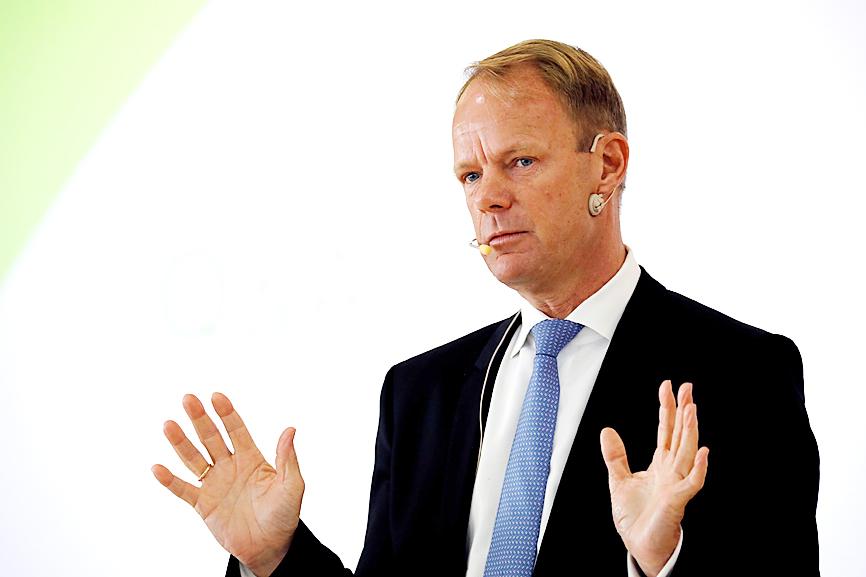The US Department of Justice (DOJ) on Tuesday charged Israeli generic drug giant Teva Pharmaceutical Industries Ltd with illegally fixing prices between 2013 and 2015.
Teva and several coconspirators “agreed to fix prices, rig bids and allocate customers for generic drugs,” including the popular cholesterol-regulating medicine Pravastatin, the department said in a statement.
Patients would have paid a total of US$350 million more than they should have, it said.

Photo: Reuters
Rejecting the charges, Teva said it was “deeply disappointed that the [US] government has chosen to proceed with this prosecution.”
Efforts to find a solution had made no progress as “the DOJ has shown an unwillingness to consider alternatives that would not deeply impact Teva and the stakeholders who depend on the company, including the patients who benefit from our medicines,” Teva said in a statement.
Five companies investigated in the case have already paid heavy fines to avoid prosecution.
Sandoz, a subsidiary of the Swiss pharmaceutical giant Novartis AG, agreed to pay US$195 million in March, and the US subsidiary of the Israeli group Taro Pharmaceuticals Industries Ltd last month agreed to pay US$205.7 million.
Other companies involved include Apotex Inc, which agreed to pay a US$24.1 million fine in May, and Glenmark Pharmaceuticals Ltd, which was indicted by a grand jury last month.
Teva, which sold US$17 billion of drugs last year, was also accused earlier this month by US authorities of artificially inflating the reimbursement price for its multiple-sclerosis drug Copaxone for patients in the government-run Medicare program.
Separately, Sepehr Sarshar, the former founder and chief executive of Auspex Pharmaceuticals Inc, was on Tuesday arrested in California on insider trading charges, accused of feeding secrets that enabled friends and family to earn more than US$700,000 illegally.
Sepehr, 53, of Encinitas, California, was charged in Manhattan federal court with securities fraud, wire fraud and fraud in connection with a tender offer.
He was released on US$1 million bail after an initial appearance in San Diego federal court.
Authorities said he provided inside information in 2015 about a pending US$3.2 billion buyout offer from Teva to his friends and family so they could trade securities in Auspex.
Additional reporting by AP

SEMICONDUCTORS: The German laser and plasma generator company will expand its local services as its specialized offerings support Taiwan’s semiconductor industries Trumpf SE + Co KG, a global leader in supplying laser technology and plasma generators used in chip production, is expanding its investments in Taiwan in an effort to deeply integrate into the global semiconductor supply chain in the pursuit of growth. The company, headquartered in Ditzingen, Germany, has invested significantly in a newly inaugurated regional technical center for plasma generators in Taoyuan, its latest expansion in Taiwan after being engaged in various industries for more than 25 years. The center, the first of its kind Trumpf built outside Germany, aims to serve customers from Taiwan, Japan, Southeast Asia and South Korea,

Gasoline and diesel prices at domestic fuel stations are to fall NT$0.2 per liter this week, down for a second consecutive week, CPC Corp, Taiwan (台灣中油) and Formosa Petrochemical Corp (台塑石化) announced yesterday. Effective today, gasoline prices at CPC and Formosa stations are to drop to NT$26.4, NT$27.9 and NT$29.9 per liter for 92, 95 and 98-octane unleaded gasoline respectively, the companies said in separate statements. The price of premium diesel is to fall to NT$24.8 per liter at CPC stations and NT$24.6 at Formosa pumps, they said. The price adjustments came even as international crude oil prices rose last week, as traders

Taiwan Semiconductor Manufacturing Co (TSMC, 台積電), which supplies advanced chips to Nvidia Corp and Apple Inc, yesterday reported NT$1.046 trillion (US$33.1 billion) in revenue for last quarter, driven by constantly strong demand for artificial intelligence (AI) chips, falling in the upper end of its forecast. Based on TSMC’s financial guidance, revenue would expand about 22 percent sequentially to the range from US$32.2 billion to US$33.4 billion during the final quarter of 2024, it told investors in October last year. Last year in total, revenue jumped 31.61 percent to NT$3.81 trillion, compared with NT$2.89 trillion generated in the year before, according to

PRECEDENTED TIMES: In news that surely does not shock, AI and tech exports drove a banner for exports last year as Taiwan’s economic growth experienced a flood tide Taiwan’s exports delivered a blockbuster finish to last year with last month’s shipments rising at the second-highest pace on record as demand for artificial intelligence (AI) hardware and advanced computing remained strong, the Ministry of Finance said yesterday. Exports surged 43.4 percent from a year earlier to US$62.48 billion last month, extending growth to 26 consecutive months. Imports climbed 14.9 percent to US$43.04 billion, the second-highest monthly level historically, resulting in a trade surplus of US$19.43 billion — more than double that of the year before. Department of Statistics Director-General Beatrice Tsai (蔡美娜) described the performance as “surprisingly outstanding,” forecasting export growth